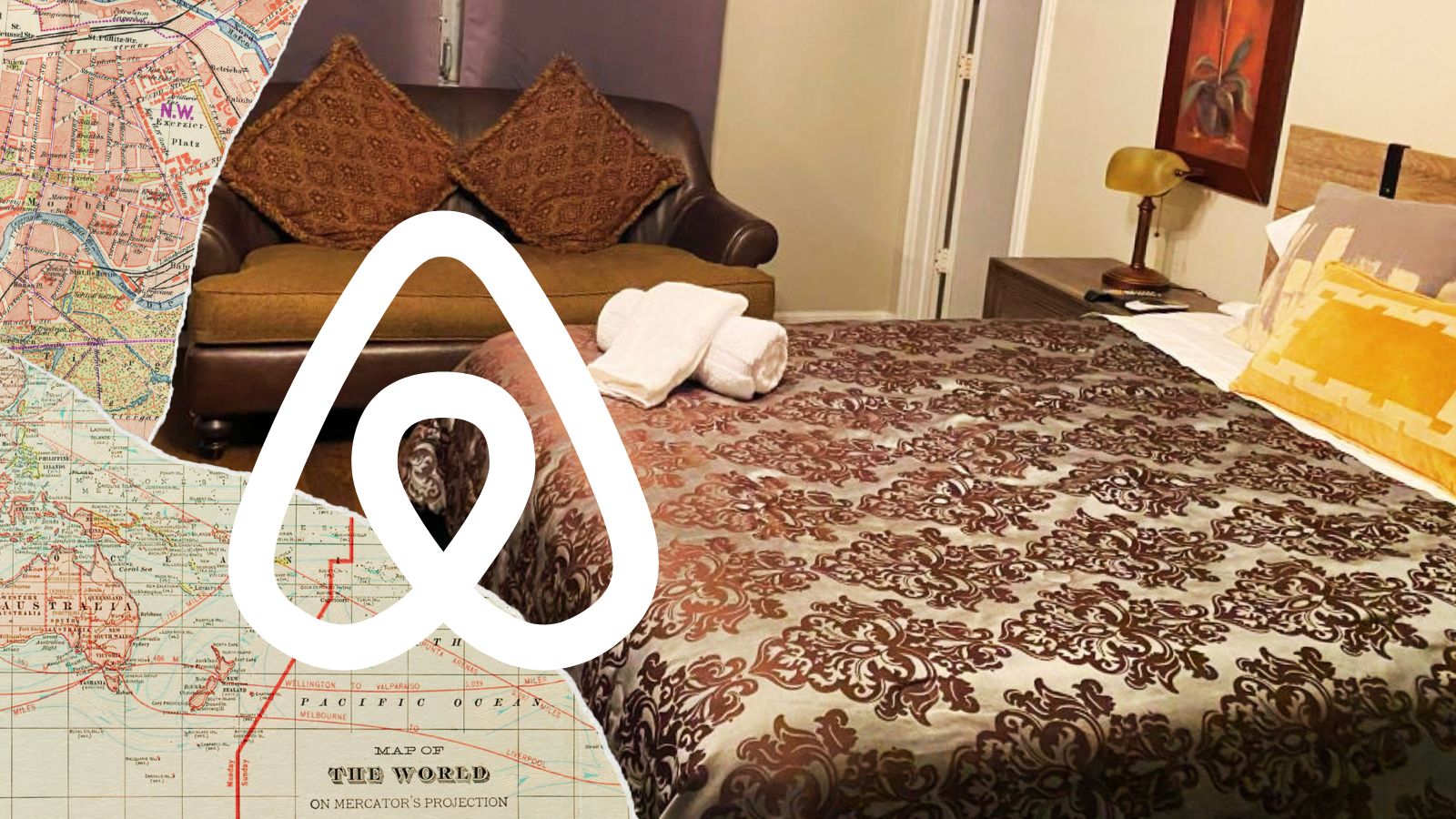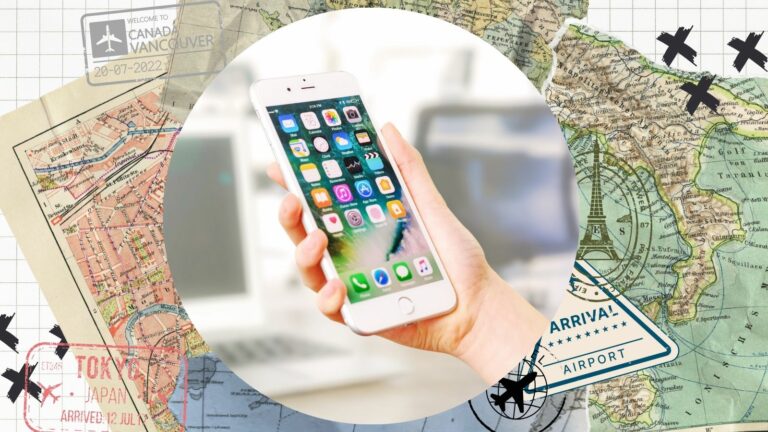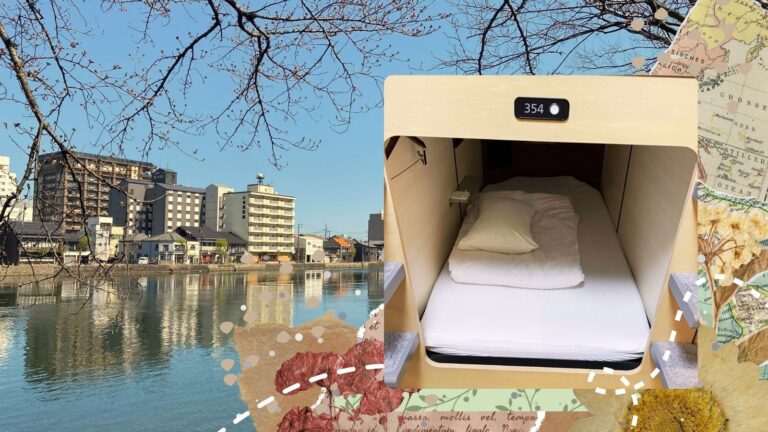How to Find Amazing AirBNBs for a Month’s Stay
Traveling slowly is one of the best ways to truly experience a destination. Whether it’s spending weeks wandering cobblestone streets or finding your favorite café in a new city, taking your time lets you connect with a place in ways that whirlwind trips just can’t. But slow travel means longer stays, and longer stays mean you need affordable accommodations…without sacrificing comfort or charm.
That’s where Airbnb can come in handy. It’s a worldwide platform with dozens of options, from cozy private rooms to entire homes. If you’re looking for somewhere to stay that’s more home-like than a hotel room, then Airbnb is the right place to look.
However, navigating the platform and finding a great deal requires a bit of strategy. Not all listings are created equal, and if you’re not careful, the extra fees can add up quickly.
In this guide, I’ll walk you through my best tips for using Airbnb as a slow traveler on a modest budget.
You’ll learn how to find the best listings, negotiate prices, and even discover alternatives to Airbnb when it’s not the right fit. Whether you’re planning a month in one spot or hopping between destinations, these tips will help you stretch your budget while making the most of your travels.
Just Gone Wandering is supported by readers! This post contains affiliate links. If you click on a link and buy something, I get a small percentage at no extra cost to you. Your support helps keep this blog running— thank you! Read full disclosure here.
new!
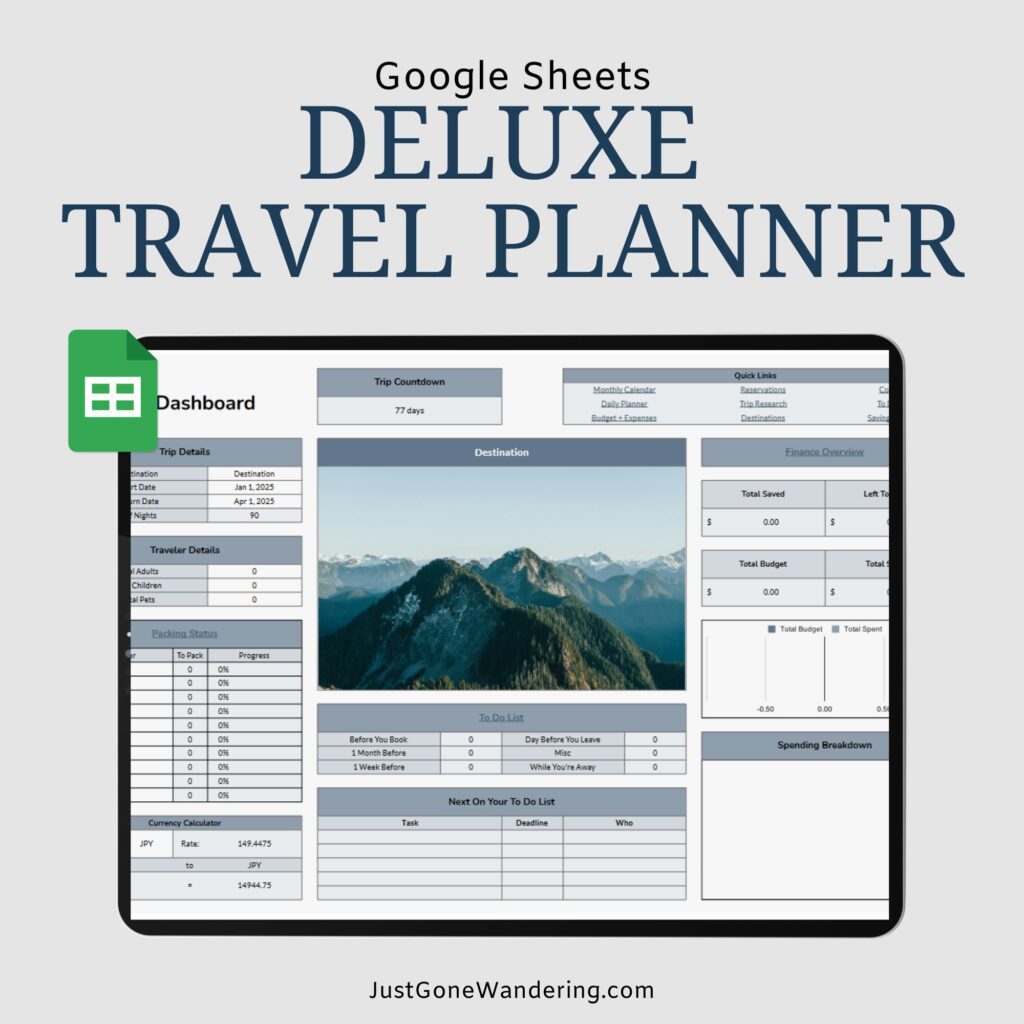
Effortless Trip Planning, All in One Place
Say goodbye to disorganized travel chaos! Everything you need, from pre-trip planning to your daily itinerary to your return home, in one simple tool.
Why Choose Airbnb as a Slow Traveler?
I like staying in Airbnbs whenever I plan to stay in a specific city for a month (or more). I usually book apartments with kitchens and private bathrooms, hosted by top-rated hosts with lots of reviews in good places in the city. The Airbnb platform provides protection for when things go wrong (although it can be difficult to get compensation sometimes) and I like that it lets me talk to the host directly before and during my stay.
Another benefit is that you can find some really amazing apartments in residential parts of the city, which normally tourists wouldn’t stay in. That lets you get a different point of view of the city, different from the standard tourist route, and it lets you “live like a local,” as it were.
Read more: Where to Stay Besides Hotels When Traveling Long-Term

How to Find an Amazing Airbnb
Finding the right Airbnb is part research, part intuition, and a little bit of luck.
The platform offers a huge variety of options, but knowing how to navigate the listings can mean the difference between a cozy, affordable stay and a crappy apartment facing a trash heap.
Here’s how to find the right Airbnb for you:
Master the Filters
Start by narrowing your options with filters. I always have a set of filters I use to narrow down choices whenever I start doing research.
First is setting the budget. If you know you don’t want to spend more than $1,000 USD for a month, then set that as your max. Booking for less than a month? Set your nightly max– and remember that you might have to pay a bit more in taxes and fees, depending on the location.
Next refine by the amenities you want. I always filter for kitchens, private bathrooms, air con (or heating) if I know I’ll need it, and high-speed wifi.
Then filter by type of Airbnb. I usually try booking an entire place, but if you don’t mind sharing spaces then you can often find coliving spaces where each guest is in a private room but share common areas like the kitchen and bathroom. These shared spaces are often much cheaper than the private apartments, too.
Deciphering Reviews
This is the key to success!
Keeping in mind that people tend to leave positive reviews even when there’s something wrong, it’s important to read through the WHOLE review, and as many reviews as you can for at least the last six months.
Look for comments on cleanliness, location, and how responsive the host is. Keep an eye out for recurring issues, like noise or mold. Sometimes things pop up in the last few months that weren’t there two years ago, so you need to pay attention to things like that.

Trust the Superhosts (Most of the Time)
Superhosts have earned their title for a reason: they consistently provide great experiences. Staying with a Superhost can often mean fewer hiccups and smoother communication.
That said, don’t discount other listings. Some of my favorite stays have been with hosts who weren’t Superhosts but had detailed descriptions and friendly bios. A little hospitality goes a long way, even if they don’t have a badge to prove it.
Scrutinize the Photos
Airbnb photos can be artfully deceptive. Wide-angle lenses and strategic lighting can make spaces seem larger or brighter than they are. Be thorough—zoom in on details, look for things like outlets near the bed (or the absence thereof), and check if the “balcony view” is of a bustling city or the neighbor’s laundry.
If key areas like the bathroom or kitchen aren’t shown, consider it a warning sign. It’s better to ask questions now than regret the lack of a functional shower later.
Know Your Cancellation Policies
Cancellation policies vary, but generally for month-long stays you have to cancel significantly in advance– if you can even cancel at all. Always double-check the policy before booking to avoid losing money if plans shift.
Finding the right Airbnb is about knowing what matters most to you. Do you prioritize privacy, location, or price? Are you okay with a little character (read: quirks), or do you need everything to be spot-on? Use the tools Airbnb provides—filters, reviews, and photos—and don’t be afraid to message a host if you have questions.
If something seems off, or if it seems too good to be true, then listen to your intuition and find another place to stay.

How to Save Money on Airbnbs
Airbnbs can be a great deal, but with a few extra tricks, you can save even more.
Here are some of my go-to strategies to keep costs down without sacrificing comfort—or at least not too much comfort.
Be Flexible with Your Dates
If your travel plans aren’t tied to specific dates, you can often score a better deal just by tweaking your arrival and departure. Airbnb’s calendar view shows pricing fluctuations, and a shift of even a day or two can save you a surprising amount.
Traveling midweek is often cheaper than weekends, and booking during off-peak seasons can drastically reduce prices. Plus, you’re less likely to compete with vacationing families or large groups, which means more listings to choose from and fewer crowds.
Stay Longer (Yes, Really)
One of Airbnb’s best-kept secrets is that many hosts offer a discount for longer stays.
If you book for a week or more, you’ll often see a lower nightly rate, and the savings for monthly stays can be even more dramatic. I’ve personally saved almost 50% on an Airbnb by booking for 28 days!
This works especially well for those practicing slow travel, where you can use one location as a base to explore the surrounding area. It also gives you time to settle in, find the best local bakery, and maybe even learn the bus schedule (always an adventure).

Negotiate with Hosts
Did you know you can message a host and ask for a discount? It’s not guaranteed to work, but if you’re staying longer or booking last-minute, it’s worth a try. I’ve done this before for a few of my long stays and I’ve saved a few hundred dollars.
Usually I’ll message something like, “Hi, I like this apartment but my budget is closer to [this amount]. Would it be possible to negotiate rates a bit?”
The key is to be friendly, respectful, and reasonable. Don’t lowball them, but don’t be afraid to negotiate if you can see their calendar is mostly empty. I find this also works really well for those leasing companies that own a BUNCH of Airbnbs.
Avoid the Airbnb Fees (When Possible)
Airbnb’s service fees and cleaning charges can add up quickly. To keep from going overboard:
- Look for listings with reasonable cleaning fees (anything over $100 for a small place should raise an eyebrow). These tend to be better in places outside of the US, tbh.
- Avoid one-night stays if you can, as the fees tend to feel much less painful when spread out over a few nights.
In some cases, if you’re staying longer, you can also ask the host if they’re willing to adjust the cleaning fee. Again, it’s not a guarantee, but it doesn’t hurt to ask.

Book Early (or Very Late)
Planning ahead is usually the best way to snag a deal, especially if you’re headed to a popular destination. Listings tend to be cheaper when there’s still plenty of availability.
On the flip side, if you’re feeling adventurous and have a flexible itinerary, last-minute bookings can sometimes yield discounts. Many hosts would rather accept a lower rate than have their place sit empty, so keep an eye on those listings a day or two before your intended stay.
Consider Shared Spaces
While it’s not everyone’s cup of tea, shared spaces—like a private room in someone’s home—are almost always cheaper than entire apartments. It’s a great way to stretch your budget, and you might even get insider tips from the host about local attractions. This works especially well in huge cities where a private apartment is cost prohibitive.
For instance, I stayed in a really nice room in a host’s condo in Edinburgh, and I saved about half what it would’ve cost for a hotel. Plus I got to chat with the host about traveling as a solo woman and my adventures around the UK!
Just be sure to read the listing carefully. Some shared spaces are casual and cozy, while others might feel like you’ve accidentally signed up for boot camp. Make sure the host’s vibe matches your own– and don’t forget you can always message them beforehand to ask questions.
Use Airbnb’s Filters to Your Advantage
Filter for listings that include amenities you’d otherwise pay for. A kitchen can save you tons on dining out, while free parking might eliminate costly garage fees in cities. Some listings even throw in extras like bikes, laundry facilities, or breakfast.
These little perks can add up and make a slightly higher nightly rate worthwhile, so think beyond just the sticker price.
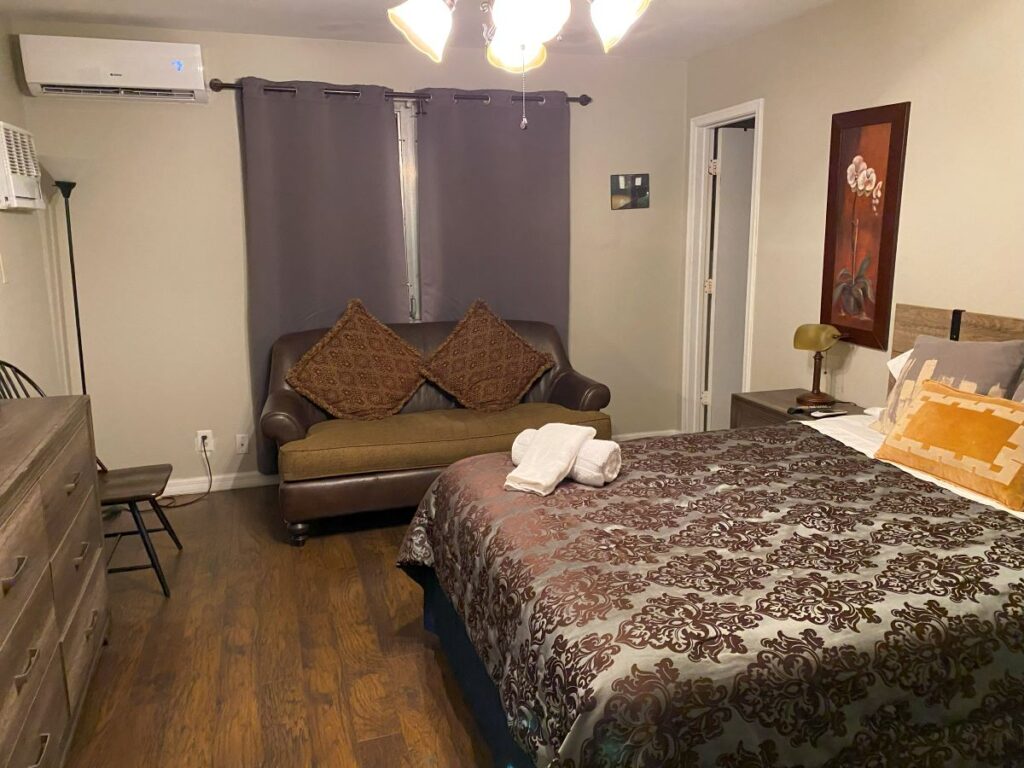
Compare Before You Book
Lastly, don’t forget to check the competition. Airbnb is great, but it’s not the only option (more on that in another section).
Take a quick look at hotel deals or other short-term rental sites to make sure you’re getting the best bang for your buck.
With these strategies, you’ll be well on your way to finding an Airbnb that fits your budget without sacrificing the fun. Because let’s be honest: the less you spend on accommodations, the more you can spend on the important stuff—like pastries, museums, and souvenirs.
Alternatives to Airbnb for Budget-Friendly Stays
Sometimes Airbnb isn’t the best fit. Whether due to high fees, limited options, or just needing something different, you might have to look for other options.
Luckily, there are plenty of other ways to find affordable and unique accommodations:
- Online Travel Agencies (OTAs): Sites like Booking.com and Agoda often list short-term rentals alongside hotels, with fewer fees and flexible cancellation policies. They’re a great place to find deals, especially last-minute.
- Facebook Groups: Many destinations have local travel or expat Facebook groups where members share rental listings. It’s a more personal way to find places and often avoids platform fees entirely.
- On-the-Ground Options: If you’re already in a location, ask around! Word of mouth and local bulletin boards can lead to unexpected gems, like family-run guesthouses or homestays that aren’t listed online.
- Hostels and Coliving Spaces: If you don’t mind shared spaces, hostels (with private rooms) and coliving spaces (like hostels for digital nomads) are a great option!
- Other Platforms: Alternatives like Vrbo, Plum Guide, or trusted hostel sites can be worth exploring, depending on your preferences.
Having a few backup options ensures you’ll always find somewhere great to stay—whether or not Airbnb fits the bill for your trip.
Read more: Alternatives to AirBNB for Short Term Rentals
Final Tips
Before you hit “Book Now,” here are a few last-minute tips to make sure your Airbnb experience is as smooth as possible:
Double-check before you book. Carefully review the listing for house rules, check-in procedures, and what’s included (or not). Don’t assume every place has basics like towels or coffee makers.
Communicate with the host. A quick message to introduce yourself or clarify questions can go a long way. It also helps you gauge how responsive they’ll be if issues arise.
Save the address. Screenshot the address and directions in case you lose internet access. Trust me, scrambling for Wi-Fi in an unfamiliar place is not fun.
Prepare for quirks. No matter how much you plan, there might be surprises—a too-soft mattress, noisy neighbors, or a shower with a personality of its own. Embrace the quirks, and they’ll likely become part of the adventure.
With these tips, your Airbnb stay can be a highlight of your trip. Happy booking!
Save to Pinterest
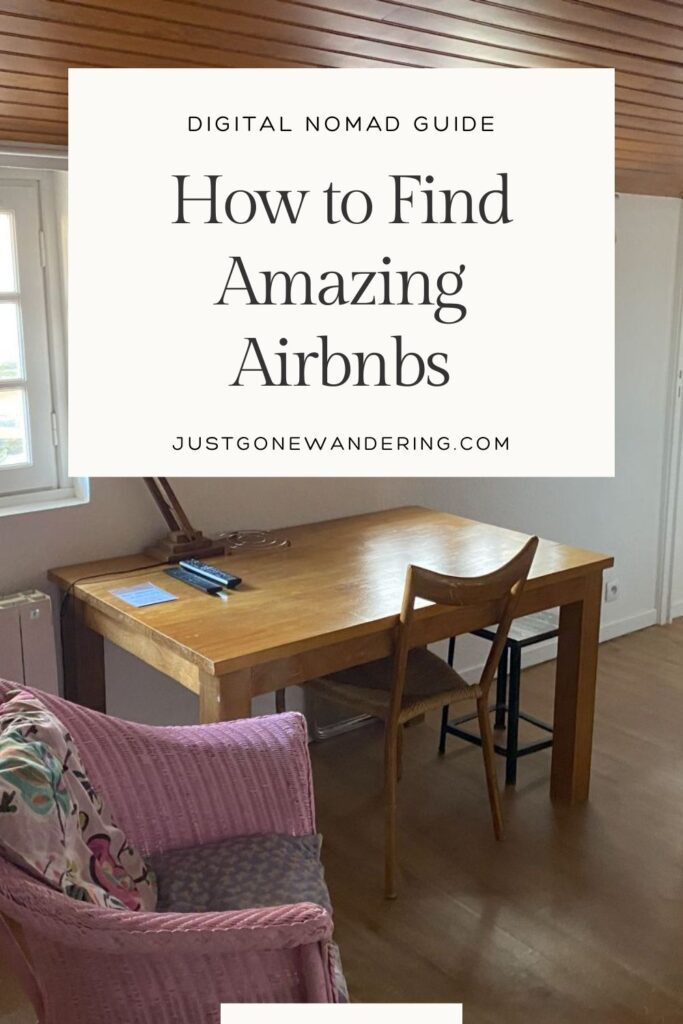

Explore More
Nomad Living
- How to Plan a Year of Full-time Travel
- Packing List for Perpetual Travel (Solo Female Cozy Budget Style)
- Backpack vs. Suitcase for Long-Term Travel
- How to keep in contact while traveling abroad
- The BEST WhatsApp Travel Group Chats
- 90+ Active Facebook Groups for Travelers
- Where to Stay Besides Hotels When Traveling Long-Term
- Travel kitchen essentials | Hotel cooking
- Best Resources for Long-Term Travel
Best Travel Resources
- 👩💻Stay organized with the Deluxe Travel Planner Spreadsheet
- 🛌Search Hostelworld for budget stays
- ✈️Search SkyScanner for discounted flights around the world
- 😺Join TrustedHousesitters and do petsitting in exchange for accommodation
- 💳Carry Chase Sapphire Preferred for a travel-friendly credit card
- 📱Use Airalo for eSIMs around the world
- 🚙Check DiscoverCars for international car rentals
- 👩💻Snag ExpressVPN to stay safe while browsing the web
- 🧑⚕️Sign up with VisitorsCoverage for trip insurance

